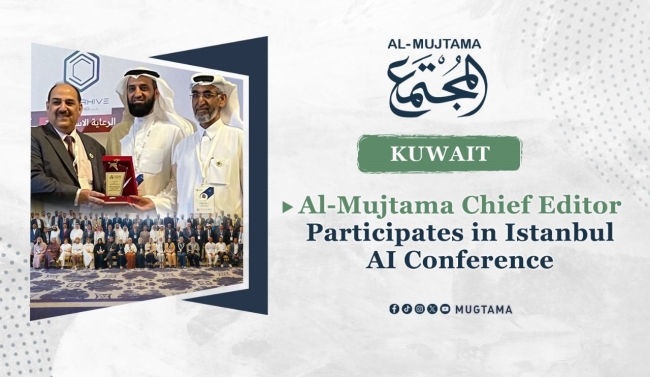Al-Mujtama Chief Editor Participates in Istanbul AI Conference Featured
AI Conference and its Role in Investment and Development kicked off in Istanbul, with a remarkable presence of official figures and representatives of civil society organizations and the private sector, in addition to the participation of delegations from more than 30 countries.
The conference focused on the importance of AI in various fields, such as training, education, and strategic analysis, which was confirmed by the conference chairman, Dr. Hamad Al-Marri, in the opening session.
Dr. Younis Khataybeh, Chairman of the Arab Trainers Union, highlighted the importance of the conference in keeping pace with rapid technological developments and their impact on business environments, extending his thanks to those in charge of organizing the conference.
Dr. Nader Ghazal, an expert in AI, reviewed the differences between artificial and human intelligence and the future of this technology.
At the end of the opening session, Major General Fahd bin Mubarak Al-Jabareen, Chairman of the Jowan bin Jassim Academy, was honored as the conference's guest of honor. The first and second sessions of the conference witnessed discussions on future professions and sciences and the role of artificial intelligence in institutional development, amid great interaction from the attendees.
Al-Mujtama Participation
One of the most prominent segments of the conference was a worksheet presented by Dr. Salem Hamad Al-Qahtani, Editor-in-Chief of the Kuwaiti magazine "Al-Mujtama", which discussed the role of artificial intelligence in improving and analyzing data and media content.
Al-Qahtani reviewed the experience of "Al-Mujtama" magazine in using artificial intelligence to improve interaction with content and media archives, pointing out the practical benefits of this technology in producing automated content, editing video and audio, and smart archiving.
Dr. Al-Qahtani explained how artificial intelligence could revolutionize how media archives are managed, from the textual classification of content to developing video and image archiving in the coming stages. This development will contribute to improving search and retrieving information quickly and accurately.
Dr. Al-Qahtani concluded his presentation by emphasizing the benefits of using artificial intelligence in the media, such as developing advanced search tools, providing automatic statistics, and improving the user experience through immediate interaction with the audience. He also pointed out the importance of prediction and scheduling in identifying the topics that most attract the audience and scheduling their publication according to the optimal times to achieve the greatest possible interaction.


